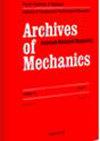热导率随温度变化且具有任意线性边界条件的FGM圆柱壳轴对称稳态温度场
IF 1.2
4区 工程技术
Q3 MATERIALS SCIENCE, CHARACTERIZATION & TESTING
引用次数: 14
摘要
本文给出了导热系数随温度变化的功能梯度材料空心圆筒轴对称热传导方程的近似解析解。考虑一般线性边界条件。利用正则扰动问题的庞加莱方法,得到了温度场的解析近似解。层次渐近问题求解到二阶逼近。最后给出了边界温度为规定温度时径向一维热传导的数值算例。将近似温度分布与全非线性问题的数值解进行了比较,从而提供了参考的“精确”解。在近似解和参考解之间建立了很好的一致性。研究了渐近级数的收敛性和温度场的性质。本文章由计算机程序翻译,如有差异,请以英文原文为准。
Axisymmetric steady temperature field in FGM cylindrical shells with temperature-dependent heat conductivity and arbitrary linear boundary conditions
An approximate analytical solution to the axisymmetric heat conduction equation for a hollow cylinder made of functionally graded material with temperature-dependent heat conductivity is presented. General linear boundary conditions are considered. The Poincare method for regular perturbation problems is employed to obtain an analytical closed-form approximate solution for the temperature field. The hierarchical asymptotic problems are solved up to the second-order approximation. A numerical example is worked out, i.e., the one-dimensional heat conduction in the radial direction with prescribed temperatures at the boundaries. The approximate temperature profiles are compared with a numerical solution of the full nonlinear problem which provides the reference “exact” solution. A good agreement between the approximate and reference solutions is established. The convergence of the asymptotic series as well as the properties of the temperature field are studied.
求助全文
通过发布文献求助,成功后即可免费获取论文全文。
去求助
来源期刊

Archives of Mechanics
工程技术-材料科学:表征与测试
CiteScore
1.40
自引率
12.50%
发文量
0
审稿时长
>12 weeks
期刊介绍:
Archives of Mechanics provides a forum for original research on mechanics of solids, fluids and discrete systems, including the development of mathematical methods for solving mechanical problems. The journal encompasses all aspects of the field, with the emphasis placed on:
-mechanics of materials: elasticity, plasticity, time-dependent phenomena, phase transformation, damage, fracture; physical and experimental foundations, micromechanics, thermodynamics, instabilities;
-methods and problems in continuum mechanics: general theory and novel applications, thermomechanics, structural analysis, porous media, contact problems;
-dynamics of material systems;
-fluid flows and interactions with solids.
Papers published in the Archives should contain original contributions dealing with theoretical, experimental, or numerical aspects of mechanical problems listed above.
The journal publishes also current announcements and information about important scientific events of possible interest to its readers, like conferences, congresses, symposia, work-shops, courses, etc.
Occasionally, special issues of the journal may be devoted to publication of all or selected papers presented at international conferences or other scientific meetings. However, all papers intended for such an issue are subjected to the usual reviewing and acceptance procedure.
 求助内容:
求助内容: 应助结果提醒方式:
应助结果提醒方式:


